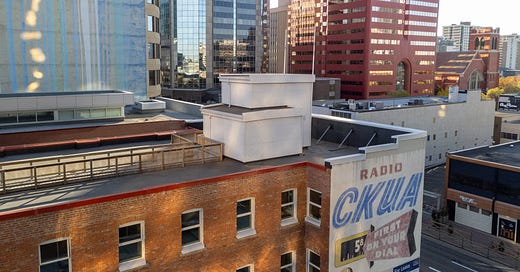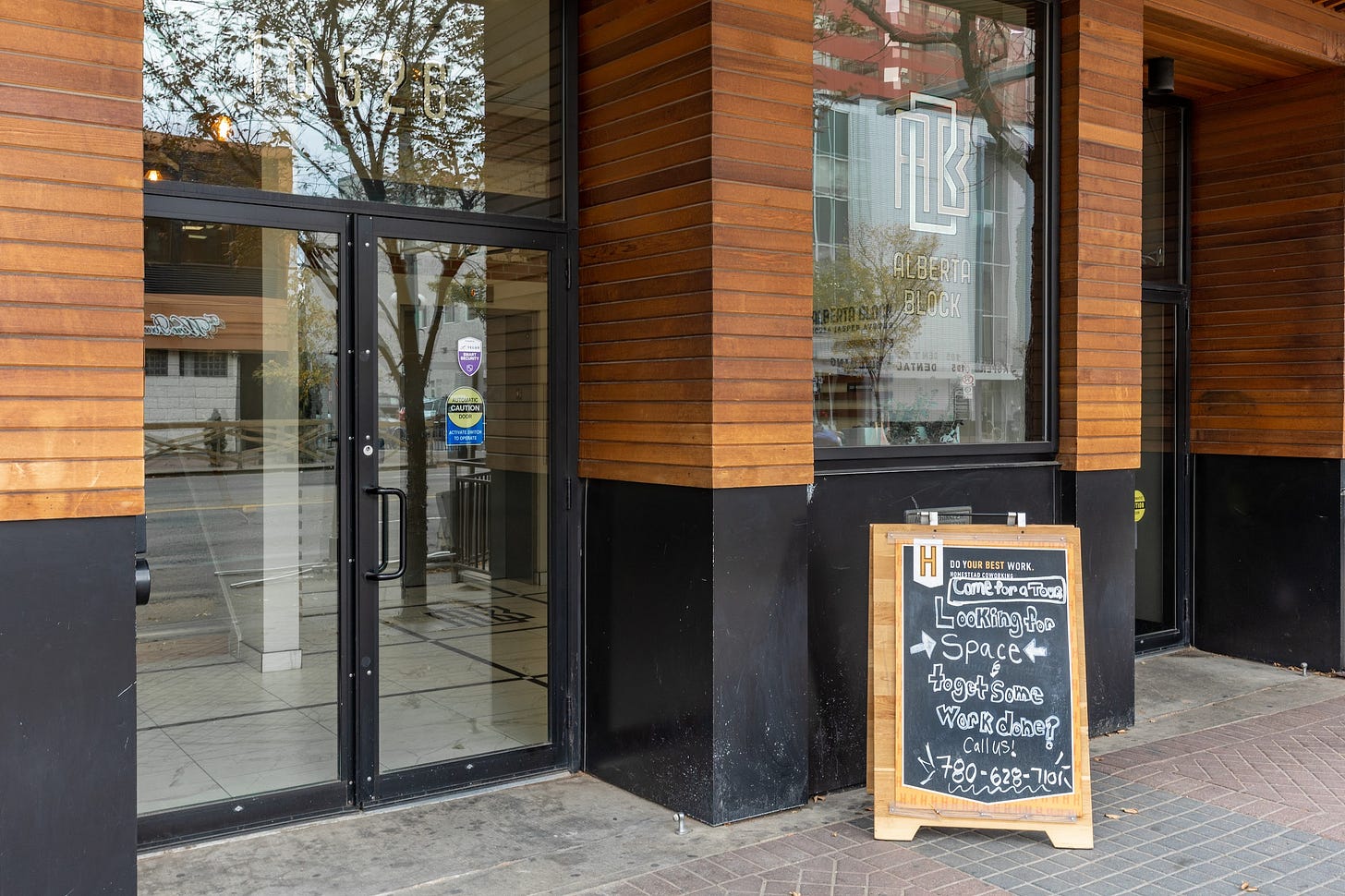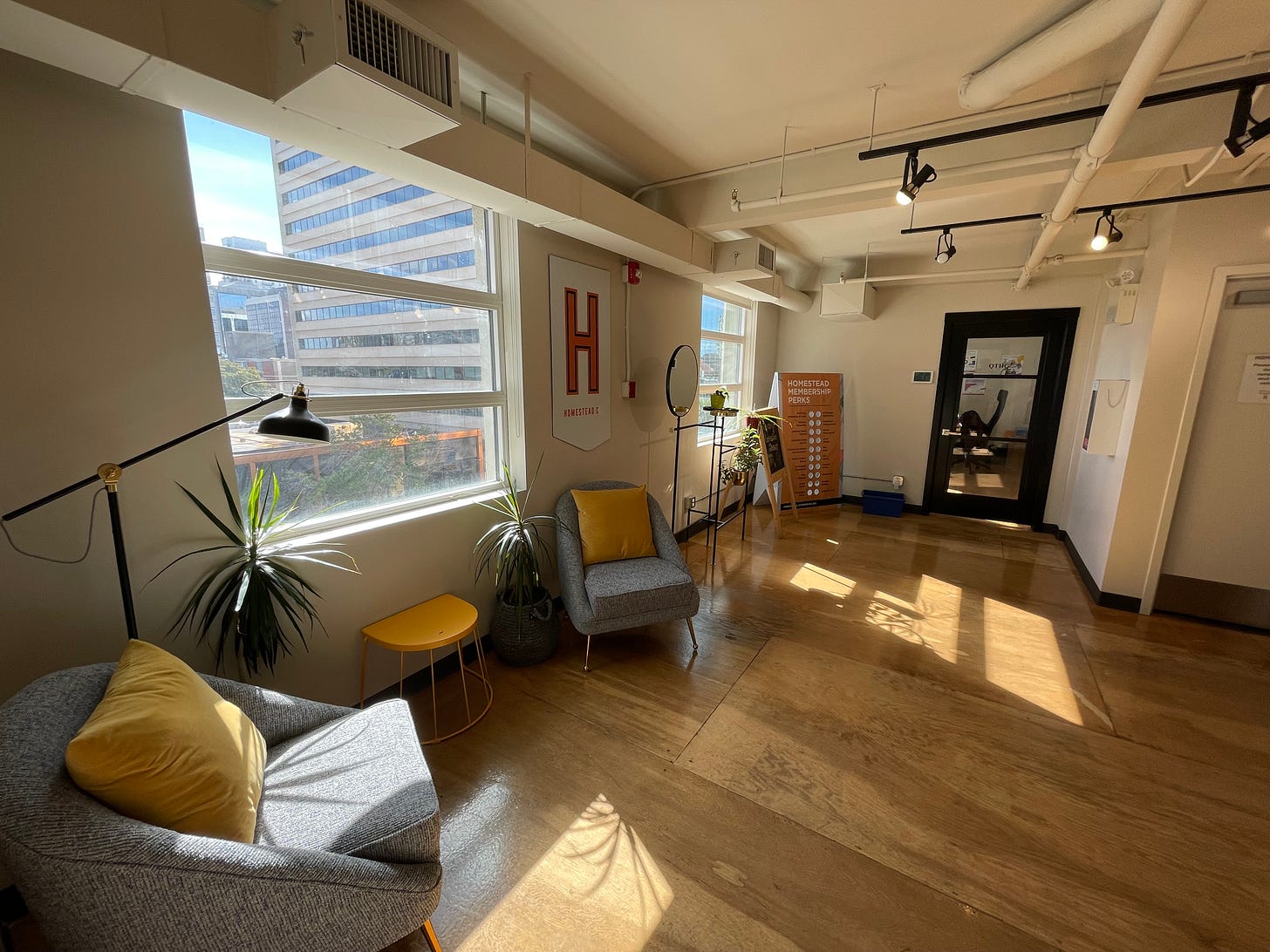Homestead Investment Co-op
Democratizing ownership of mainstreet bricks and mortar with a community economic development approach
[UPDATE March 31, 2025: read a kind and thorough piece on this project from the Edmonton Journal.]
I’ve been on the lookout for hopeful indicators lately, amidst everything challenging, and particularly for opportunities to make good things happen that don’t depend on government support. I’ve spent a lot of time helping make this one happen: an economic development and revitalization project in Edmonton’s downtown, with intent to grow across Alberta. With a blend of real estate acumen and social entrepreneurship, we’ve prototyped an equity co-op investment model that I think can work beyond Alberta, and beyond this commercial real estate concept.
When I was wrapping up at City Hall in 2021, I sat down with Tegan Martin-Drysdale. She had chaired Edmonton’s Next Gen group when I was the city councillor assigned to youth engagement. We’ve kept in touch as we share a passion for city building and for real estate innovation. She asked me then what I was going to do next, and at the time I still didn’t know. So she offered me a desk at her co-working space on Jasper Avenue, Homestead Co-working, while I figured out my path. Sounded lovely, but ‘‘what’s the catch?’ Tegan just asked me to hang out and meet and support the other creators and entrepreneurs when I had time (which has led to some meaningful and rewarding collaborations for Civic Good) and to help her think about how to shift the co-working model toward something community-owned.
After a lot of research and exploration, Tegan and I co-founded Alberta’s newest co-op: Homestead Investment Co-op to solve for community ownership of the building, powered by co-working and tenant owners. We’ve since recruited a brilliant and dedicated group of board members and allies to buy the storied Alberta Block Building on Jasper Avenue at 106 Street. It was the long-time home of CKUA radio, a beacon of community connectivity across Alberta, a history you can still see on the murals on the brick facades.
Alberta Block is anchored on the main floor by Fu’s Repair Shop (awarded best restaurant in Edmonton, and represented on our board), with the co-working space and other offices above. The building is near full with its existing leases, and was deeply retrofitted in 2014 to be energy efficient, with new boilers and elevator, and has low operating costs. Tegan helped lead the retrofit and knows the building well. With the current leases in place it can produce minimum 6% returns, plus long term appreciation of capital.
Even if we rounded up a dozen peers, there’s no way we could buy a building like this. But with a hundred people, now it becomes attainable.
Turns out the co-operative model runs deep on the Prairies, as we learned putting ours together with help from others who’ve done it. From recent examples like successful short line railroads, to co-ops that helped electrify Alberta farms generations back, there’s a deep tradition of people coming together to make things happen for their communities.
We have our sights on this building to start with, but our intent is to grow a portfolio of buildings across Alberta, owned by a mix of building tenants, community investors, and even employees of the businesses. Albertans invested here together in building up our communities. Strategically, we figure these buildings will have less turnover as opportunities to rent from yourself and your community make it stickier from a retention standpoint — and if your business outgrows the space, we can go buy another building for the portfolio, and backfill it with co-working space to expand the network further and help incubate and expand the community of neighbours, community builders and investors. That sense of community will set this investment approach apart. You can read Tegan’s take here in a Taproot piece from this summer from before the formal launch of this fundraising round
Not only does the co-op structure democratize the opportunity to own shares in an asset class out of most people’s reach, but we can do it in ways that are still tax competitive. We’ve also worked with the Common Good Capital to be able to hold the shares in RRSPs or TFSAs. You can easily transfer funds from an existing RRSP or TFSA, which is what I’m doing. And of course you can make fresh RRSP contributions for these shares, and get the same tax refund you’d normally expect.
The way it works is to apply to join the Co-op and commit to buy a Class A membership share for $250. Everyone needs one of these and it’s what your member rights like voting at the AGM are attached to. It’s refundable if you decide to leave too.
For the equity shares (a literal share in the value of the building that can grow as the building gains value over time) you select which shareholder group you want to join - Class B which is the $10,000-99,999 range, and Class C which is $100,000 and up. The only difference between them is the larger Class C investors get to select a board member to represent them on the Co-op’s board. This is not a get rich quick thing, it’s a hold with a minimum five year commitment during which time it will accumulate dividends and appreciate, like any market investment, and with corresponding market risks.
We’ve structured the raise to allow for no less than 50% equity, with up to a 50% mortgage, but room to raise more up to the full value of the building with no need for a mortgage. The less debt we have on the first building, the sooner we can refinance and go looking for the next addition to the portfolio.
The board has build in some incentives for early adopters: 4% discount for the first million raised (going fast!), 2% discount for the next million raised. We’ve also created the H-100 program to recognize the inaugural 100 members who will make this happen, with your name inscribed in a prominent place in the building and a keepsake. I’m very proud to be H-2 on this one, with thanks to Tegan’s leadership.
If you’re interested in learning more, feel free to:
reach out with questions to grow@homesteadcowork.ca;
and if you’re keen to see the detailed Offering Memorandum, you can sign up to access the investor portal here.
PS: I haven’t written for a while, partly because my new duties as Chair at CMHC (ICYMI) have added a lot to my plate — but if I’m totally honest, watching the erosion of civil norms around us, and feeling the vicious headwinds facing so many of our key public institutions in this climate, I haven’t really known what to say. By contrast, this project has represented a much more uplifting community effort in the midst of, well, everything! I’m glad to be able to finally reveal it.







This reminds me of the work of the Centre for Social Innovation and Tonya Surman in Toronto. It also lends to the opportunities presented by Kristopher Stevens at Cohousing Options Canada. Great insights.